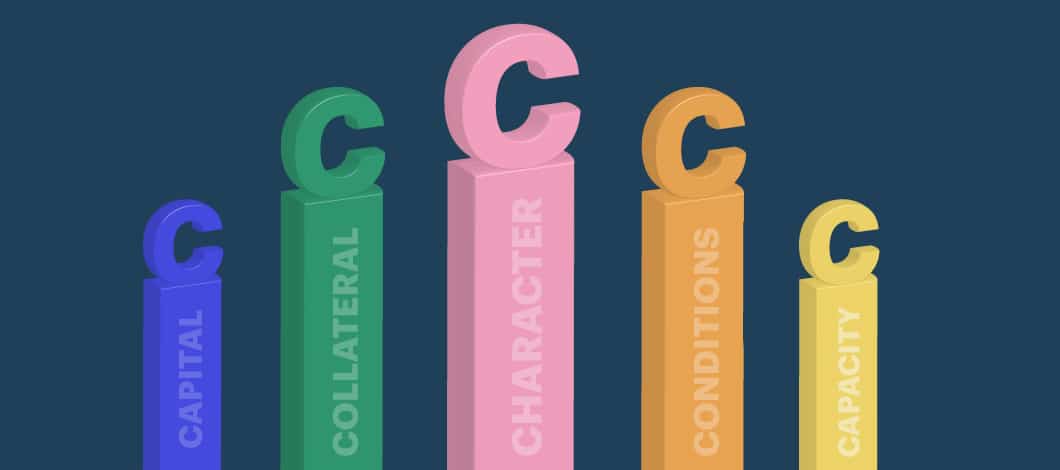When underwriters and creditors consider your loan or credit application, they take several factors into account, including the 5 C’s of credit, which refer to capital, collateral, character, conditions and capacity.
Let’s learn more about each of the 5 C’s to help you secure the funding your business needs to reach its goals.
What Are the 5 C’s of Credit?
Lenders analyze 5 main factors when you apply for business credit. Known in the industry as “the 5 C’s of credit,” these considerations are applied whenever a creditor decides whether issuing a loan passes an acceptable risk threshold.
1. Capital
Capital in the 5 C’s of credit refers to the amount of money you need to put toward the loan or investment.
Think of a down payment on a mortgage — when you place a 4% down payment on a $500,000 home, you’re offering to put up $20,000 in capital on the mortgage. Putting up larger amounts of capital on a loan or investment increases the lender’s confidence in your ability to repay it.
Generally, the higher your down payment is, the more likely you will get approved for the mortgage. The same rule often applies to credit borrowing: The more money you have to secure a loan, the greater your chances of approval.
2. Collateral
The 5 C’s of credit analysis that lenders perform also includes reviewing collateral, which is the capital or assets a borrower pledges to secure a loan. Putting up collateral reduces risk for the lender because they can take possession of the collateral if the borrower defaults on the loan.
When loans are backed by collateral, they are referred to as secured loans, which can be secured by either the assets of a business or an individual.
One of the main benefits of a secured loan is that they’re typically offered at a lower interest rate. In other words, putting down a deposit in the form of collateral can reduce the amount you pay for the loan over time.
If you lack an impressive credit history, it could be in your best interest to set aside assets to offer as collateral.
3. Character
Character in lending is just that — the character, or integrity, of the borrower.
When considering applicants for a loan, lenders tend to shy away from people who operate questionable businesses with poor FICO scores. Instead, they’d rather lend to transparent companies that have positive reviews from customers and the media, with impressive scores from risk analysts and credit bureaus.
If you want to keep your chances of approval as high as possible, take the following credit factors into account.
- FICO score (i.e., 550 or above)
- Number of years in business
- Number of credit applications filed in the last 9 months
- Collections and liens over the last 7 years
- On-time payment history
4. Conditions
Condition refers to the factors within your business — and industry as a whole — that can impact your ability to repay a loan.
Your lender wants to know financing is being obtained for responsible reasons that won’t hurt your ability to make repayments. For instance, a 5 C’s of credit example demonstrating conditions would be the need for funding to expand your business or buy equipment. These are appealing conditions to lenders because they could help your business remain competitive, better serve customers and ultimately generate more revenue.
However, there are several other conditions that can make a lender reconsider financing your business, and sometimes they’re factors outside of your control. If your business operates in an industry that’s oversaturated with competition or in an overall decline, lenders could see these conditions putting you at a greater risk of defaulting on a loan.
5. Capacity
No 5 C’s of credit definition would be complete without capacity. Having the capacity, or cash flow, to repay a loan or other form of financing is a key component of the 5 C’s of credit. Lenders want to know that you can afford to pay back any amount you borrow.
When thinking about this component of the 5 C’s of credit, you should know what your debt-to-income (DTI) ratio is. Indeed, the old maxim of “know thyself” can prove useful even when applying for business financing.
DTI considers your business’s annual income and measures it against your recurring debts. It provides you with a figure to determine how easily you can pay off additional debts.
To find your DTI ratio, check your balance sheet and plug your business’s financial information into the following formula: DTI Ratio = Recurring Monthly Liabilities ÷ Gross Monthly Income.
Ideally, you’ll want your DTI ratio to be 36% or less to be in the running for most loans.

Why Are the 5 C’s of Credit Important?
The importance of the 5 C’s of credit comes down to this: Lenders — whether they are small business creditors or mortgage lenders — always want to minimize risk. The lower the risk to the lender, the more likely it is that your application will be approved.
Your best bet when it comes to getting your credit application approved is to master the art (and science) of the 5 C’s of credit. Keeping tabs on your FICO SBSS, personal and business credit history, as well as pledging assets as business collateral (such as equipment, inventory, accounts receivable and real estate) can go a long way toward maximizing your creditworthiness.
Remember that the 5 C’s of credit are also a holistic approach to evaluating financing applicants. Intangible factors such as business reputation and flexibility are as important as credit history.
Keep in mind, creditors don’t want to feel as if they’re gambling on your business. They want their investment to be a sure thing. That’s why you need to go the extra mile to keep the 5 C’s — your capital, character, capacity, collateral and conditions — in check.










